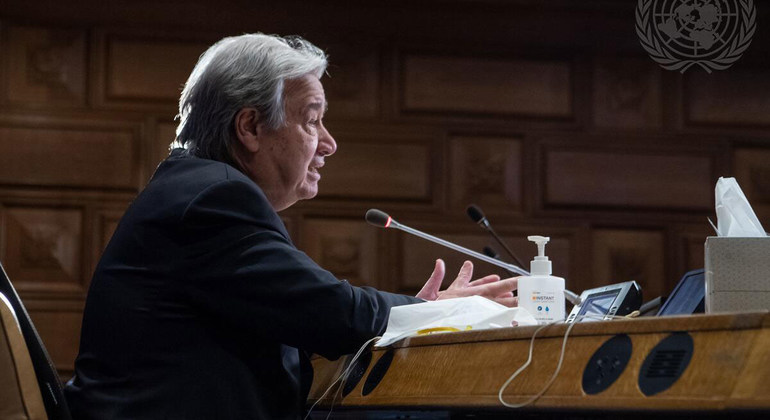“I welcome the many initiatives the new United States administration has already taken to support multilateral responses to global challenges, and to strengthen cooperation between the US and the UN”, said António Guterres, sharing a screen with Secretary of State Antony Blinken, and the host country’s new UN Ambassador, Linda Thomas-Greenfield.
Back in the multilateral fold
The UN chief cited rejoining the Paris Agreement, re-committing to the World Health Organization (WHO) in the face of the continuing coronavirus pandemic, and re-engaging with the Human Rights Council, as vital reversals of the previous Trump administration’s withdrawal from the multilateral stage.
“The commitment and contribution of the United States are essential to resolve the many serious global challenges we face – starting with the COVID-19 pandemic”, said Mr. Guterres.
Ending the pandemic
“To end the pandemic everywhere, I have been insisting and I strongly believe we need a global vaccination plan, and I think the United States can play a very important role on this because, as you know, I have proposed that the G20 should establish an emergency task force to develop and coordinate such a plan but there is no way that this can work without an effective American leadership.”
On the need to drastically slow the pace of global warming and take climate action to fulfil the promises made in Paris, the UN chief said the postponed COP26 in Glasgow, was a true make or break moment “for our planet”.
Climate coalition
“We are working closely together to build a global coalition for net zero emissions by mid-century, which has been a top priority for us in the UN for 2021, and to mobilize an immediate quantum leap in adaptation, and in finance to support developing countries”, he told the top US diplomats. “Adaptation cannot be the forgotten part of climate action and we very much count on US leadership in this regard. In my last contacts with John Kerry, he was very keen on working very strongly on adaptation and financing.”
Fighting famine
Famine is already destroying lives across six countries, and Mr. Guterres said he was happy to see the US using its presidency of the Security Council this month, to lead debates on fighting hunger and using diplomacy for peace.
“We will work to reach lasting agreements in Afghanistan and Yemen; to consolidate our efforts in Libya; to achieve tangible progress through the political dialogue in Syria that has not yet happened; and to restart the Middle East peace process”, he said.
We need a new movement for peace, from war zones to people’s homes, where women and girls are facing an epidemic of gender-based violence. On the other hand I am very keen that we can deliver on what I call my Call to Action on Human Rights.”
The Secretary-General said that people everywhere were “demanding an end to systemic racism, discrimination and persecution, and protection for the rights of women, the marginalized, and minorities of all kinds.
“The United Nations is I believe the place to tackle our joint challenges and reaffirm our common values.”
UN ‘the anchor’ of multilateralism: Blinken
In response, Mr. Blinken said the UN was “the anchor of the multilateral system”, which the Biden administration sees as “vitally important”.
“When we think about virtually all of the problems and challenges that are actually going to affect the lives – are affecting the lives – of our citizens, whether it’s COVID-19, whether it’s climate, whether it is the disruption of emerging technologies, not a single one can be dealt with by any one country acting alone, even the United States”, he said.
“We need to find ways to cooperate, to coordinate, to tackle problems together. And of course, the United Nations is where countries come together to work on common challenges.”
‘Profound stake’ in the UN’s success
Mr. Blinken said the US had a “profound stake” in the UN working well, noting President Biden’s own commitment to multilateralism, as evidenced through re-engagement with UN institutions, “from day one”.
“I’ve very much appreciated your own leadership on these issues and in dealing with many of the crises and challenges that we face around the world, from Ethiopia to Burma”, he told the UN chief. “We have a broad, broad agenda. I think you’ve got one of the toughest jobs in the world, but we’re grateful that you’re doing it and grateful to have the United Nations as a strong partner in our efforts.”



